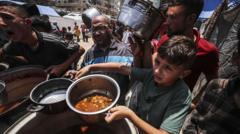The IDF reports finding the body of Hamas military leader Mohammed Sinwar in a tunnel beneath a hospital, raising accusations against Hamas regarding the use of civilian infrastructure. The renewed violence coincides with increased casualties in Gaza, with the international community expressing concern over the humanitarian impact.
Israeli Forces Claim Identification of Hamas Leader's Body in Khan Younis

Israeli Forces Claim Identification of Hamas Leader's Body in Khan Younis
The Israeli military has announced the identification of Mohammed Sinwar's body amid continued conflict in Gaza, raising complex questions regarding military strategy and humanitarian implications.
The Israeli military has announced that it has located and confirmed the identity of Mohammed Sinwar, the military leader of Hamas in Gaza. The Israel Defense Forces (IDF) stated that his body was found in a tunnel situated beneath the European Hospital in Khan Younis, which they verified through DNA testing. Hamas has not yet acknowledged his death publicly. Sinwar, aged 49, was reportedly killed in an air strike on May 13, an attack that the Hamas-run civil defense agency stated resulted in 28 fatalities and numerous injuries.
The IDF indicated that Sinwar's body was discovered alongside that of Mohammad Sabaneh, the commander of Hamas's Rafah Brigade. Further investigations are underway as investigators located items belonging to both figures, along with additional intelligence insights. In an effort to provide evidence of their claims, the IDF facilitated a visit for a select group of foreign journalists to the site of the tunnel, showcasing its narrow corridors and adjoining rooms.
IDF spokesperson Brigadier General Effie Defrin accused Hamas of exploiting civilian infrastructure, emphasizing that hospitals are being used as shields for military operations. This assertion points to ongoing tensions between military actions and humanitarian concerns on the ground, with accusations surfacing from various angles about the treatment of hospitals during the conflict.
International concerns are heightened as the IDF has conducted numerous strikes on hospitals or compelled evacuations, severely impacting the already strained health care system in Gaza. UN Secretary-General Antonio Guterres previously voiced deep alarm at attacks on medical facilities, urging respect for international humanitarian laws protecting the wounded, medical personnel, and hospitals.
Following an unprecedented cross-border attack by Hamas on October 7, 2023, which resulted in over 1,200 deaths and numerous hostages, Israel initiated a military campaign in Gaza, aiming to dismantle Hamas and retrieve hostages. The IDF claims that over 54,880 people have perished in Gaza since the onset of this renewed violence, according to reports from the Hamas-run health ministry.
As this military campaign continues, and following a broken ceasefire and hostage exchange talks, reports emerged of Sinwar being entrenched within Hamas's command structure. He joined Hamas shortly after its establishment in the late 1980s and held positions within the Izzedine al-Qassam Brigades, ultimately leading the Khan Younis Brigade by 2005.
The death of Mohammed Sinwar follows the recent loss of his brother, Yahya Sinwar, who was greatly implicated in the planning of the October 7 attack and was killed in an operation led by Israeli forces last October. The ongoing conflict and escalating violence in Gaza continue to pose pressing humanitarian and geopolitical challenges, echoing dilemmas faced by global actors engaged in responses to the crisis.


















